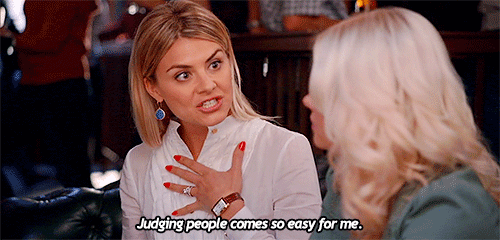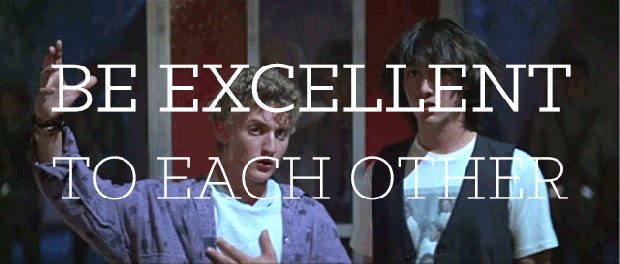Dear Student Affairs family,
I love you. I do. Granted, it’s not as much as I love The Lord of the Rings but it is more than I love Agents of S.H.I.E.L.D (geek translator: still oodles and bunches of love).
But we’ve got to recognize something, especially with conference season kicking into gear: There is a culture of fear within student affairs, perpetuated by the term “Student Affairs is a small world”.
Here’s the thing: that phrase is fairly accurate. Just last night at an ACPA SCGSNP social I found myself in a group of folks knew via one degree of separation. Our field is relatively small and due to graduate school, people moving around to different institutions, professional organization work, and more, we essentially have fewer degrees of separation than Kevin Bacon (and collectively, not counting SSAO folks, we make his monthly salary).
Too often, from our campus to national settings, there are whispers of warnings about the concept of “professionalism” and a nicely-wrapped statement that boils down to: “Be professional. If you screw up, student affairs is a small world and you will never, ever get a job”.
It’s like there is a Student Affairs Santa making his/her/their list and checking it twice.
I know – some of you may be mentally protesting already. “Well Niki, it’s true. If someone doesn’t dress professional or drinks too much or acts in a certain manner or is all hooking up at a conference, people will indeed judge them (as people do) and that could negatively affect their career. It’s important we warn folks – especially graduate students and new professionals – of this so that they will be on their best behavior. We can’t control how other folks react so it’s good to play it safe.”
And I get it.
It’s like how I know student affairs systemically discriminates against minoritized folks (ex: majority of SSAOs are white men with other privileged identities) and I will, for example, inform my fellow women of this bias and help them navigate professional ventures with taking this systemic issue into account. I’m not fear mongering, I am real talking so they can advance as safely as possible in this field.
It’s difficult, however, to see the issue of student affairs’ culture of fear in regards to professional conduct in the same light.
Problematic Aspects of “SA is a Small World (after all)”
- Creates a “morality police”: Often the statement is meant to dissuade folks from drinking alcohol or acting in an unbecoming manner. I’m not saying “yes, let’s promote dangerous behavior, such as binge drinking” but I also think that folks are too judgmental on how they view other folks. So I see people acting like they are going to hook up after a social! Cool, dudes. Enjoy your lives – your actions do not affect me.
- Promotes a climate of judgement: We are human beings, and human beings often judge others, either consciously (shade!) or unconsciously (secret shade!). It’s going to happen. But by perpetuating this statement, we are making a statement that it is okay to judge someone’s behavior and let that interaction/moment affect their professional livelihood.
- Strikes down the concept that we, like our students are continuously developing: It’s unfair to judge someone by their actions from a past moment and assume they have not grown. So someone made an ignorant comment once or even twice – don’t act like you have been (and are) so enlightened.
- Perpetuates a white supremacist patriarchal heteronormative culture: Wait! Please don’t stop reading. I know these words scare a lot of folks. They are ‘mean’ and ‘student affairs isn’t mean’! But every time we talk about “Be professional” what we are really supporting is a concept of how folks should dress, act, and speak that was created in our country by wealthy white men and these professional norms still support that same group of people. Imagine, for example, that someone who you perceived to be a man was wearing high heels to a conference session. Would the thought of “that’s so unprofessional” cross your mind? Yet gender norms are unfair daily oppressions and we should allow folks to express their gender as they desire. However, we have been taught to interpret that the word “professional” is that of a mild-mannered white man in a suit, and we judge negatively folks who live outside that image.
- Roots itself in hypocrisy: I think what is darkly humorous about all the “Student Affairs professionalism codes” is that we know there are definitely some senior student affairs officers (SSAOs) indulge in heavy drinking behavior. And that’s cool! You do you. We all engage in different forms of socialization/stress relief. But why do we (collectively it happens a lot, even if not within every region/campus) say things perpetuating fear of drinking to newer professionals lest someone thinks ill of them?
So how do I do my own work to subvert this culture of fear? When I see someone take action or look outside the norm of professionalism that I personally live, I try to remember a few things:
- Recognize one or a few or even multiple interactions with a human being does not define them. Humans are multifaceted awesome creatures who are continuously developing. Just because they said or did something that I disagree with does not mean I have immediate insight into their mind and spirit.
- Remember I’ve certainly done things that were disagreeable to others. Let’s not share secrets in a blog post, but I am not perfect. I have made and will continue to make mistakes. Judge not lest ye be judged, as one religious text summarizes.
- Understand that people are going to make different choices than me (dress, drinking, sex, speech, etc) and that, within reason (aka no Dexter-level or Joker-level behavior), is perfectly acceptable.
I understand that we have to operate within the systems that exist. I understand that there are real consequences for folks who do not engage in the professional conduct codes. I understand that some aspects of these codes are needed for the profession.
But what I don’t understand is why we cannot have a nuanced and real dialogue of this “Student Affairs is a small world” ideology – stating it exists but also stating that it is not okay and discussing how to subvert this culture.
There are real consequences of this fear mongering – folks feeling they have to be inauthentic in behavior or dress, folks feeling like it is okay to judge others and let those perceptions limit future opportunities, and folks not engaging for fear of being judged (seen often in SA ethics or social justice discussions).
With #ACPA15 happening right now, this blog post has been on my mind as I keep hearing/reading tips on professionalism because student affairs is a small world. I’d rather we only discuss how small the world is when we are discussing networking and connecting to advance our personal selves, our students, and our field.
What are your thoughts? Send a tweet to @NikiMessmore. I’d love to hear them! I promise that I won’t judge you, either 🙂



You are absolutely spot-on! Great post, Niki! You are such a valuable student affairs professional, and SO SO SO many are learning from your expertise. Love love, to you!
LikeLiked by 2 people
Michael Goodman! You always make me blush. Thank you for the support, always!
❤ ❤ ❤
LikeLike
This entire article is so on point! I was just discussing the same topic about professionalism with my colleagues at my institution recently. As a new professional I couldn’t agree more about the fear-mongering piece, because I definitely heard a lot of that during grad school and felt as though some how I was being told to not be myself in certain spaces. Great job!
LikeLiked by 2 people
Thanks for your feedback, Pangie! I felt similar during grad school as well. Maybe if enough of us see there is a problem, we can work to stop the cycle with our own grads!
LikeLike
I love EVERYTHING about this piece- I’ve wanted to write something on this topic but to be honest I didn’t think I could be as “professional” as I should be while doing it so I’ve put that idea on the backburner (further proving your point); for a field that preaches tolerance, acceptance, growth and individuality we sometimes do a terrible job of exhibiting these traits with each other. We all know someone who may have been blocked from an opportunity or who may have even left the field because of this mentality, and it really is time we start being more reflective on how these actions can create a culture we don’t want to live with. Great work- looking forward to more of your stuff soon!
LikeLike
This is how I feel too, having been let go from my first professional position (not for any malpractice, but rather just ‘bad fit’, although with a promise of support as reference). The anxiety caused by that is pretty intense, esp. in a really close region.
LikeLike
Reblogged this on sarealtalk and commented:
Thank you for this. I agree this is an important topic and definitely a fear imparted upon myself and fellow graduate students. In my mind I’ve always revolted against that idea – I’m not going to act crazed, but I will be myself and do as I wish – take me or leave me!
LikeLike
Thank you so much for this. I always found it hypocritical that we praise ourselves for being inclusive, but do not necessarily extend that past the more typical “isms”. I am who I am, and I plan to make a difference in Student Affairs regardless of how i am perceived.
Bravo x1000 for this!!!
LikeLike
Great article and actually one of the reasons that I left the field. Some of the folks that I worked for along the way perpetuated a “fear of the fishbowl” which is not the message new professionals need to hear. For exhibitors like me, it’s conference season all the time. And it’s very apparent in my interactions and observations as to who’s comfortable in being who they are and who’s afraid of ending up on James Spaders’ Blacklist. My advice: the world is already small enough – be yourself, for better or worse.
LikeLike
I appreciated the thoughts with this article as well! Jason, were the ‘Jason Gross’ who had the canceled ACPA session for “Oh the Places You Can Go Outside of Student Affairs”? If so, I would love to connect and learn more.
LikeLike
I really appreciate your thoughts, but I think your premise may be slightly flawed. The worlds of ACPA and NASPA can be small because these are both (or perhaps a single) community of practitioners who regularly choose to get together and become aware of the goings-on in each others personal and professional lives. I’ve worked at several institutions for that world, or anyone’s ‘unprofessionalism’ in it, would not even register. There are so many practitioners who have never been to a conference or attend and do no participate in that small world zeitgeist. If you embarrass yourself in front of an individual one night and end up across the table from them at Placement the next morning, yes, that could affect your job prospects. But the interviewer at the next table would have no idea. It’s actually a big world of student affairs and ACPA/NASPA are only a small part.
LikeLike
Will respond here as I did on FB where someone shared as I missed this and you this weekend – Although smaller in scope or maybe less than six degrees…knowing a person is not the same as perception of knowing people. Not even a little. And there are still lots of folks who do not know everyone well or at all. We need to be a lot more honest and authentic with one another, especially that honesty/authenticity that makes us uncomfortable, that honesty that we share in bathrooms and bars but not as often in large ballrooms of professionals seeking where we must march on together by embracing our failures along with our successes Diversity brings disruption and speaking to diversity of our thoughts are key as well, even when those thoughts speak directly into the face of power, privilege, politics, and fear itself. This field has far too many educators afraid to even raise their hand out of fear of failure, judgment, or their own diversity of any kind including what’s on their mind. We need a nuanced and genuine dialogue indeed. I wrote these recently and may be of use/interest to some folks as well to contribute to the related dialogue. “We can do better” http://bit.ly/1MPnMHv http://bit.ly/1zSpmTG Thank you so much for contributing your voice to get us to talk openly about what many talk about only in secret. We’re educators; let’s talk in the light of day.
LikeLike
Point number 4 though…! Yes and more yes!
LikeLiked by 1 person
Great post! I agree with what you have said. There is another bothersome layer to this as well – the notion that we feel the need to tell people what to do to “help them”. Why should I care if you get drunk at a conference and it may or may not impact your career? That is your decision. We are all grown adults. We need to stop treating grads and new pros like our students that need “fixing”.
LikeLiked by 1 person
I would expand this to include the fear-mongering and issues around job searching in Student Affairs as well. One pitfall I’ve seen is that new professionals in particular can fall prey to pressures around staying in a job for fear of being “black-listed” for searching during “off-season” or in circumstances that are difficult for the office (being short staffed already, etc.).
LikeLiked by 1 person
I wholeheartedly agree with everything you said. I’m a new professional and sadly enough, after over a year working professionally in SA I think it’s time for me to leave. I see this all the time at conferences and at work – I can’t necessarily be myself or else my future prospects will go down the drain. I went to the NASPA regional in Anaheim and I experienced this to a T, especially in front of new professionals. I think that there is a fear of not wanting to appear incompetent, but this is so hypocritical of us – we tell our students to follow their dreams and be themselves, yet we as professionals cannot do the same. This was really enlightening to read, although I suspect this trend will not fade away anytime soon.
LikeLiked by 1 person
I find this post to be a breath of fresh air. I am a NASPA person and although I really try my best to be my most competent and professional self at conferences so I don’t embarrass my place of employment…I’m me. No matter how I try to hide it, by the end of day one I’ve given up the heels and suits, I’d rather sightsee than network, and I’m hopelessly awkward at the fancy dinner I get invited to. And I don’t care, because I’ve got to be me. The idea of “professionalism” will be extra challenging this year, as we’re in New Orleans!
LikeLiked by 1 person
This was very accurate, as SA professionals who promote authenticity we have to do a better job implementing it within our own lives. I am not going to leave my name on this post, “You know it’s a small World” lol…
LikeLike
I absolutely loved this article. I shared it with my HESA class, a few different professionals, and even some undergraduates asking me about advice on grad programs: nearly all of them squirmed in their seats.
Thank you, thank you, THANK YOU for sharing such a critical lens in a “very small field.”
LikeLike
Thank you very much! I’m glad to hear that it’s been shared and it’s making folks uncomfortable as they contemplate this phenomena.
LikeLike